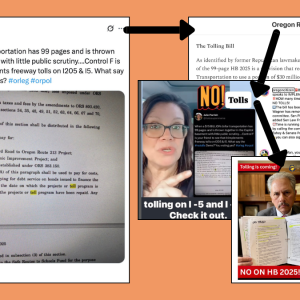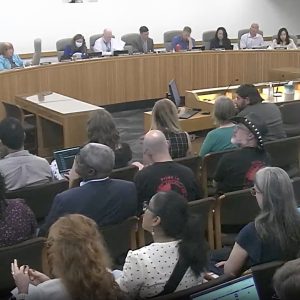The latest from Salem about the transportation funding bill is that there’s yet another delay. Tuesday afternoon reports confirmed that Democrats have opted to delay a vote in the Senate (initially scheduled for this morning) two weeks so one of their members can recover from a medical issue and cast their vote in the capital building.
The move is just the latest twist in a long road of surprises that have defined Democrats’ efforts to fund Oregon’s transportation system. It also underscores how Democrats need every single vote from their party in order to achieve the three-fifths majority required to pass a tax hike (and how Republicans are so determined to see them fail).
Right before this delay was confirmed in the media yesterday, I talked with an advocate who’s done with all the surprises. 1000 Friends of Oregon Transportation Policy Manager Cassie Wilson has worked for over a year as a leader with the Move Oregon Forward coalition in hopes of passing a transportation bill that goes beyond freeway expansion megaprojects and continues the march toward better transit, bicycling, and walking conditions statewide.
Wilson is frustrated about how far the bill has been whittled down by Democrats — to the point where she and her fellow advocates can only show tepid support — while Republicans rejoice and use the bill to rile up their base right before the 2026 elections. “A lot of Democrats were put in a position to have to vote for a version of the bill that none of us wanted to see,” Wilson shared with me in an interview yesterday. And it’s one thing for the bill to be so compromised many members of the Move Oregon Coalition came out as neutral on it, but another thing for Democrats to not make much of a fuss about the last-second amendments that made the bill even weaker on things the coalition has prioritized since Day One.
“I was pretty disappointed watching the House floor yesterday to not see many legislators talk about the investments that are still needed, or even mentioning the transit funding sunset. This isn’t the answer, and it just it makes a bad situation feel worse, because it feels like they’re glossing over it,” Wilson shared.
“We have no guarantees that we’ll have a supermajority again, or a Democratic governor. There’s no guarantees of anything.”
– Cassie Wilson, 1000 Friends of Oregon
The transit funding sunset was the main bargaining chip Republicans used to give Democrats the quorum they needed to pass a bill during the special session that began on Friday. Instead of a doubling of the payroll tax (from 0.1% to 0.2%) to pay for transit into perpetuity, Democrats agreed to sunset the tax at the end of 2027. When transit faces another fiscal cliff at that time, Wilson worries Democrats might not have any power to preserve its funding.
“We have no guarantees that we’ll have a supermajority again, or a Democratic governor. There’s no guarantees of anything,” Wilson continued.
And now, with a highly compromised bill that’s essentially a stop-gap measure to keep ODOT and city and county road agencies afloat, Wilson worries that if it gets referred to voters, its supporters won’t exactly be eager to defend it. “You have to leave the bill intact enough with good stuff to give up a reason to defend it,” she explained.
As Wilson endures what feels like a never-ending legislative session, she’s clinging to one major positive that has come from all of this. The last year or so of organizing has helped Wilson and the Move Oregon Forward coalition, “Built a cohort of legislators who really care about and understand this issue,” she said. It’s a coalition she’s eager to put to work in future legislative sessions. “This is the biggest movement of people advocating around transportation in a very long time, or maybe ever, in terms of statewide organized efforts. We have over 50 organizations in the coalition with statewide representation and that’s not going away. We have a lot to build on.”
— You can listen and watch our full conversation in the players above, on YouTube, or wherever you get your podcasts.








Thanks for reading.
BikePortland has served this community with independent community journalism since 2005. We rely on subscriptions from readers like you to survive. Your financial support is vital in keeping this valuable resource alive and well.
Please subscribe today to strengthen and expand our work.
Wait, this is even worse than I thought: do you mean that the existing transit tax will be repealed in 2028 if this bill passes? I thought the tax would revert to the existing 0.1% rate…
Sorry if it wasn’t clear, but no: The tax reverts back to 0.1% on Jan 1 2028.
Thanks for this interesting conversation. The Ds have screwed this process up royally.
Podcast tip: See if you can get your guest to agree ahead of time what s/he will cover and then share what you will cover. Otherwise your long explanations tend to override everything and your guest is kinda hanging out there with nothing to do.
And all my coworkers have been talking about this week is how the “income tax doubled” and “registration tax doubled”. I feel like they got huge amounts of negative PR without really getting much out of it.
So on brand for the democrats.
Re income tax, that’s totally false. STIF is a tiny part of the income tax, and it went from .1% to .2%
What does that mean? For someone making $60,000 per year, the increase in STIF taxes is exactly $60 per year.
“We have no guarantees that we’ll have a supermajority again, or a Democratic governor. There are no guarantees of anything,” Wilson continued.
I think what Cassie said should be a wake-up call. The Democrats in Oregon continue to disappoint me. In 1974, when I was living in Alaska, I cast my first vote, and I haven’t missed an election since. As best I can recall, I’ve never voted for a Republican candidate, and I can’t foresee doing so now given where the party stands.
I’m currently a NAV, and if the Democrats don’t get their act together, I’ll remain a NAV.
what’s a NAV?
Non-Aligned Voter; i.e. independent
OK, I looked it up. NAV = non-affiliated voter.
Seems like if a party is disappointing you, affiliating and being able to vote in their primaries would be the preferred alternative.
I apologize for the delayed reply. Email subscriptions for BP stories haven’t been working for me since July 31 (I informed Jonathan), and I don’t check back on stories often.
I also apologize for not spelling out NAV. I assumed it was commonly understood since there are currently more people registered as NAV than with either major party in Oregon. See Voter Registration by County, August 2025: https://sos.oregon.gov/elections/Documents/registration/2025-August.pdf
For the past few years, prior to each primary, I’ve switched back to Democrat. I’d like to see Oregon adopt open primaries. We’re an outlier among the 50 states. See: https://ballotpedia.org/Primary_election_types_by_state
I guess I don’t understand what being a NAV accomplishes when you declare an affiliation before a primary so that you can vote in it.
Aside from being a NAV now as a form of protest, switching on before a primary and off afterward allows me to avoid having my personal information shared with other parties. There are other reasons. Feed this to an AI bot. The results make sense to me.
“What are some Oregon-specific reasons why someone might register as non-affiliated (NAV)”
Kulongoski helped build the Democrats’ dominance in Oregon. If he’s saying the current system isn’t working, that’s a positive endorsement in my book.
“Kulongoski Lends His Name to New Ballot Initiatives Pushing for Open Primaries”
Oregon Journalism Project, Willamette Week
October 22, 2025 9:42PM PDT
https://www.wweek.com/news/state/2025/10/22/kulongoski-lends-his-name-to-new-ballot-initiatives-pushing-for-open-primaries/
Unpopular opinion: This absolute turd of a bill would not pass if so-called “progressives” refused to vote for it.
Unpopular amongst the faithful maybe, but an accurate statement.
This is a rare instance of a fact being stated as an opinion
Update to info in the podcast: Javadi switched parties; now a “Democrat.”
However, in his latest newsletter the part about transportation said Zero about transit, walking, biking or climate– only about maintaining roads to drive on.
His newsletter also reinforces that He hasn’t changed; his party has gone off the deep end.
Instead of fighting an uphill battle to bring his party back to where he is (center-right with a strong anti-abortion stance), he’s switching and running as a Democrat and will undoubtedly work hard to pull the Oregon Democrats even more towards the “conservative” side.
It also means that instead of Javadi (my take is if he ran as a Republican he’d win the primary; my experience is people in Tillamook County like brave individualists) and a more progressive Democrat in the 2026 election, it’ll likely be a more “party-line” Republican and Javadi. (Or a
Which is his perogative but I think will likely be bad for the things that public and active transit interested folks want.
It’s really tempting to sing the praises of “converts” but please let’s try to avoid incentivizing Democrats further away from what we want on public transportation, active transportation or climate…